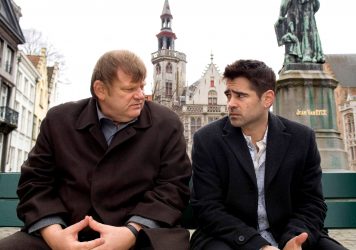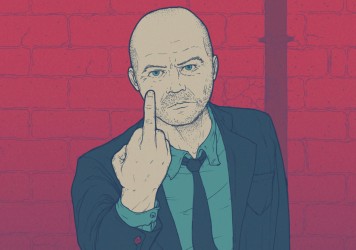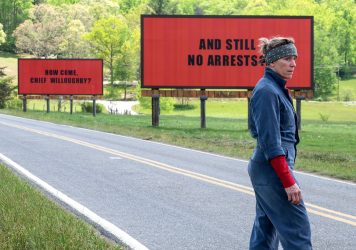Dognapping! Vigilante killings! Christopher Walken's cravat! Just a few things you’ll find in Martin McDonagh’s latest.
Martin McDonagh’s Seven Psychopaths is a lunatic shaggy dog yarn that’s helplessly in thrall to ’90s pop ephemera. As a follow-up to In Bruges, it’s fascinating, often very amusing and certainly a more daring and idiosyncratic (if less instantly crowd-pleasing) cinematic feat.
It’s an unwieldy film about a confused writer that positively heaves with subtext and self-effacing insider barbs. It’s perhaps even more interesting when taken in the light of In Bruges, as McDonagh appears to be using this new film to deconstruct the criticisms levelled at his mischievous debut, most notably whether it’s truly possible to sympathise with a murderer.
Colin Farrell plays a washed-up, hooch-addled Irish screenwriter named, ahem, Marty, who is stifled in his attempts to make a new and original statement about screen violence. His gauche, mouthy best pal Billy (a film-stealing Sam Rockwell) wants to help him out, but his time is taken up with kidnapping dogs and ransoming them back to their owners. He executes this scam with the help of Christopher Walken’s laconic, cravat-sporting hustler, Hans, who is attempting to raise the cash to pay for an operation for his terminally ill wife.
All this dog bothering courts the ire of trigger-happy local hood Charlie (Woody Harrelson), especially when Billy messes with the wrong mutt. To say any more would both spoil the fun and undersell the film, as McDonagh flips, remoulds, recounts and digresses at any and every opportunity, distancing himself from a three-act buddy road movie and instead fashioning a verbose, excitable, multi-tentacled essay on male relationships, pedantic semantics and cinematic lore.
The writer/director’s propensity for wilfully blindsiding the viewer occasionally backfires, coming across as shock for shock’s sake, but he mostly manages to pull off these combative flights of fancy with ribald aplomb.
The director also displays a magpie-like fondness for ’90s indie cinema, borrowing the poetic, desert-bound confessional from Takeshi Kitano’s Sonatine, the labyrinthine neo-noir plotting from the Coen brothers’ The Big Lebowski, and every ounce of meta-swagger that he could wring from Tarantino’s Pulp Fiction. Hans’ surname is even Kieslowski. And yet the numerous scenes of bickering and swearing are raised to the level of dark poetry, with one sprawling and hilarious campfire monologue delivered by Rockwell that truly has to be seen to be believed.
But where McDonagh can do no wrong as a writer, he stumbles as a director, often settling for functional medium shots as a way of merely capturing the free-flowing dialogue. There is an awful lot to process in this film, and by the time you reach the home straight there is the vague sense that McDonagh has tied himself in knots.
It’s sometimes hard to gauge how the discursive vignettes interlock with one another, bar the slightly nebulous and unfulfilling suggestion that writing about and researching psychopaths is something of a deadly and unpredictable pursuit. But this is more than a fascinating folly.
It’s an example of an artist pushing both himself and his subject matter to their outer limits. McDonagh is laying dynamite at the base of a decrepit old institution, and it’s invigorating to witness.
Published 5 Dec 2012
The Irish playwright’s long-awaited follow-up to his much-loved debut, In Bruges.
Hilarious, unwieldy, clever, snarky and snide it may be, but it’s always entertaining.
What does it all mean? Seeing this one again would be a pleasure, not a chore.

By Kevin Maher
Playwright-turned-director Martin McDonagh's debut is darker than your average hitmen-in-peril comedy.

The War on Everyone writer/director opens up about his conflicted relationship with his craft.

By Ed Gibbs
Frances McDormand unleashes hell in the blackest of black comedies, courtesy of Martin McDonagh.